4 August 2021
Sheep milk producers supplying the cheese market could increase the overall cheese yield potential of their flock by carrying ewes with a low somatic cell count (SCC).
The first year of a European Innovation Partnership (EIP) Wales study has shown the potential impact that SCCs and chronic sub clinical infection could have on the productivity of flocks.
Three 15-ewe groups of Frieslands, Lleyns and Lleyns supplemented with a higher level of selenium are involved in the three-year EIP project.
Plotting the SCC against total milk solids for each of the individual milk samples from the 45 ewes has shown that the majority with high SCC are at the lower end of the total solids percentage.
This is indicative of ewes with a possible chronic sub clinical infection and high SCC having poorer milk quality and its negative influence on the yield of cheese produced.
With a growing interest in sheep milk production in Wales, these initial findings are valuable for new and existing producers, says Geraint Hughes, the project’s Innovation Broker.
The results are based on individual ewe sampling for milk bacteria, SCC as a marker of udder inflammation and possible clinical or sub clinical mastitis, milk butterfat, protein and lactose percentages and Aerobic Plate Counts of bacteria. Bulk milk samples were also taken.
Nasal swabs were taken twice from the Frieslands and the Lleyns that hadn’t received a selenium boost, to study the presence and type of bacteria in nasal cavities and to investigate any correlation between udder and nasal cavity bacterial populations.
No correlation seemed to exist between nasal and milk bacteriological samples on any of the ewes, says Mr Hughes.
“There had been suggestions in previous work that the bacteriology of the nasal cavities in sheep could have given an insight to the bacteriology of the udders but we didn't find anything to suggest that and have therefore dismissed it.’’
Of the 45 ewes, a total of six across all groups had a high SCC – notably five of were Frieslands.
On average, Lleyn ewes without enhanced selenium had the highest butterfat average at 7.6%; for the supplemented Lleyns that average was 7.29% and for the Frieslands 6.21%.
Supplemented Lleyns had the highest average protein percentage - 6.67% - compared 6.62% in the other Lleyn group and 6.02% in the Frieslands.
There was minimal difference in the lactose percentage of all three groups - the range varied from 4.52% for the Frieslands to 4.46% in the un-supplemented Lleyns; for the third group it was 4.36%.
With stark differences between the breeds, another year of testing will be useful, says Mr Hughes.
“It has been interesting also to see how the bacteriology is influenced by stage of lactation,’’ says Mr Hughes.
The study group, including award-winning cheesemaker Dr Carrie Rimes, hope that this work will benefit all dairy sheep farmers in Wales who are looking to supply a cheese market, as well as cheese makers.
Dr Rimes, whose milk suppliers include one of the study farmers, Alan Jones, reports a significant improvement in the quality of the curds in her cheesemaking process this year.
“There has definitely been a more consistent supply of milk this year,’’ she says.
A reason for this could be that, informed by the research findings, Mr Jones is removing some of the high cell count milkers from his flock of 180 Lleyns.
The study, he says, has also reaffirmed his commitment to the Lleyn breed.
“As this study has shown, the quality of Lleyn milk is ideally suited to cheese production,’’ says Mr Jones, of Derwen Gam, Pwllheli.
In addition to this study, Farming Connect has been supporting the fledgling dairy sheep sector in Wales through its Agrisgôp and Management Exchange Programmes.
Two webinars have also been held this year; both were exceptionally well attended with over 70 farmers joining the first.
And Farming Connect will soon upload a ‘Zoom around the World’ video featuring Irish dairy sheep farmers George and Hanna of Ballyhubbock Farm.
EIP Wales, which is delivered by Menter a Busnes and Farming Connect, has received funding through the Welsh Government Rural Communities - Rural Development Programme 2014-2020, which is funded by the European Agricultural Fund for Rural Development and the Welsh Government.

